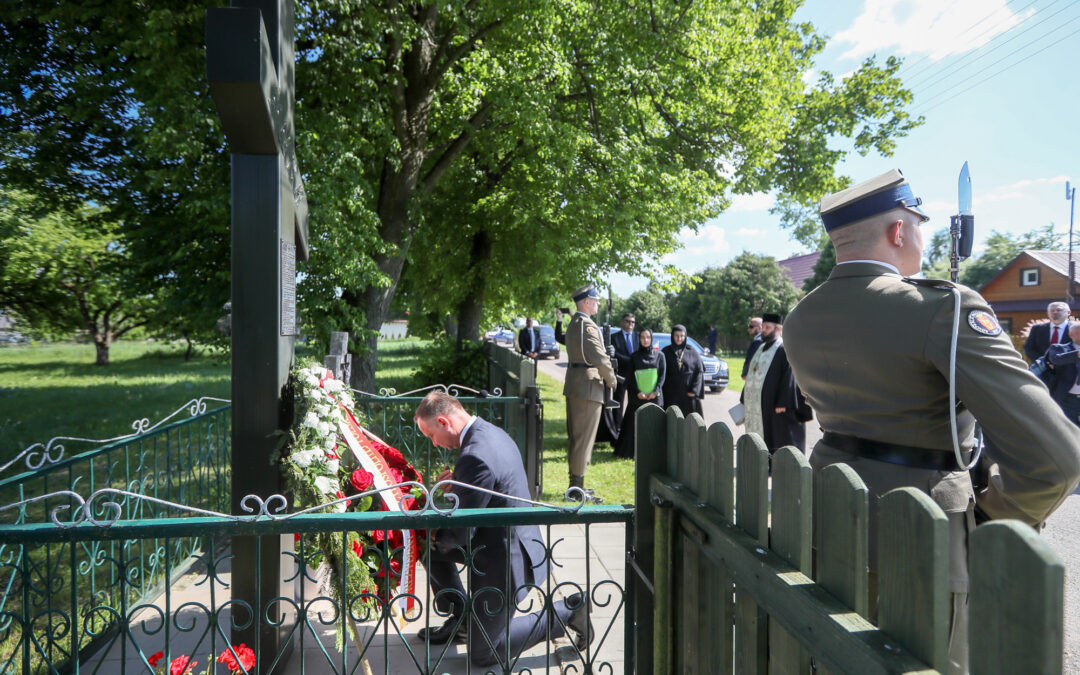Poland’s president, Andrzej Duda, has laid flowers at a memorial to Belarusians killed in 1946 by a unit of Polish anti-communist resistance fighters. The gesture has been welcomed by the local Belarusian community as a “historic gesture” of reconciliation over a troubled aspect of history.
The move also comes amid increased tension between Belarus and Poland over Warsaw’s support for the democratic Belarusian opposition and wartime history. President Alexander Lukashenko yesterday declared a new national holiday marking the anniversary of the Soviet invasion of Poland in 1939.
President Duda’s gesture came during a visit to Zaleszany, a village in northeast Poland, where he had been invited by the local Belarusian community.
Prezydent RP @AndrzejDuda w Zaleszanach na Podlasiu oddał hołd ofiarom, w miejscu naznaczonym cierpieniem, gdzie zginęli niewinni cywilni mieszkańcy, Białorusini, Obywatele Rzeczypospolitej.
Pamięć! pic.twitter.com/elYJfavWat— Kancelaria Prezydenta (@prezydentpl) June 7, 2021
He laid a wreath at a monument to ethnic Belarusians killed by a unit of the National Military Union (NZW), an organisation that resisted the imposition of communism in Poland at the end of and after the Second World War.
The unit in question, led by Romuald Rajs (known by the nom de guerre “Bury”), killed 79 Polish civilians of Belarusian ethnicity during raids motivated by locals’ alleged cooperation with the communists. Many were burned alive, including a number of children.
Though the fact of the killings is not in dispute, their memory remains contested, with nationalists in Poland continuing to honour Rajs as an anti-communist hero.
In 2005, Poland’s Institute of National Remembrance (IPN), a state body responsible for investigating historical crimes, found that the massacres “bear the hallmarks of genocide”. However, in 2019, the IPN reversed that position, saying the killings should not be regarded as genocidal.
After visiting the monument, Duda spoke with local residents about the massacres, including with some who remember them, reports Bielsk.eu. Later, he addressed the issue again during a visit to a school in the nearby town of Bielsk Podlaski that offers a Belarusian language curriculum.
“Zaleszany is a place marked by the suffering and death of Belarusians living in the [Polish] Republic,” he said. “People – innocent women and children – died there.”
Duda also referred to the historical diversity of the Podlasie region in which Zaleszany is located, which has been home to Poles, Belarusians, Jews, Muslims and various other ethnic and religious groups. This “multiculturalism…is a great quality”, said the president.
“Unfortunately, many activities are carried out to divide our nations, and yet…despite [our] differences, we constitute a community and this is what I wanted to express with my presence in Podlasie,” added Duda, who also visited an Orthodox monastery during his trip.
“This is an extremely important event in the history of the Belarusian minority in Poland,” said Eugeniusz Wappa, one of the leaders of the community. “This gesture in Zaleszany is a historic event,” agreed Oleg Łatyszonek, from the Belarusian Historical Society.
In Poland’s last national census, in 2011, almost 47,000 people identified their nationality as Belarusian, with most living in Podlasie. In recent years, large numbers of Belarusians have come to Poland as both economic migrants and to escape persecution in their homeland.
The president’s visit to the region comes amid growing tension with Belarus. President Lukashenko has condemned Warsaw’s support for the Belarusian democratic opposition, accusing it of seeking to incite chaos in order to reclaim former Polish territory from Belarus.
Earlier this year, a number of leading figures from Belarus’s ethnic Polish minority were detained. They have been accused by Belarusian prosecutors of “rehabilitating Nazism and justifying the genocide of the Belarusian nation”.
The claims relate to events honouring the so-called “cursed soldiers” (żołnierze wyklęci), partisans who resisted the introduction of communism in Poland after World War Two. Some of the fighters, such as Rajs, were involved in war crimes against non-Polish ethnic groups, yet are still often commemorated today.
Last year, Duda also sought to calm longstanding tensions over history with Ukraine. During a meeting with his Ukrainian counterpart, Volodymyr Zelensky, in Kyiv, the two presidents “recognised the need to honour the innocent victims of the conflicts and political repressions of the 20th century”.
Main image credit: Marek Borawski/KPRP/Prezydent.pl

Daniel Tilles is editor-in-chief of Notes from Poland. He has written on Polish affairs for a wide range of publications, including Foreign Policy, POLITICO Europe, EUobserver and Dziennik Gazeta Prawna.




















